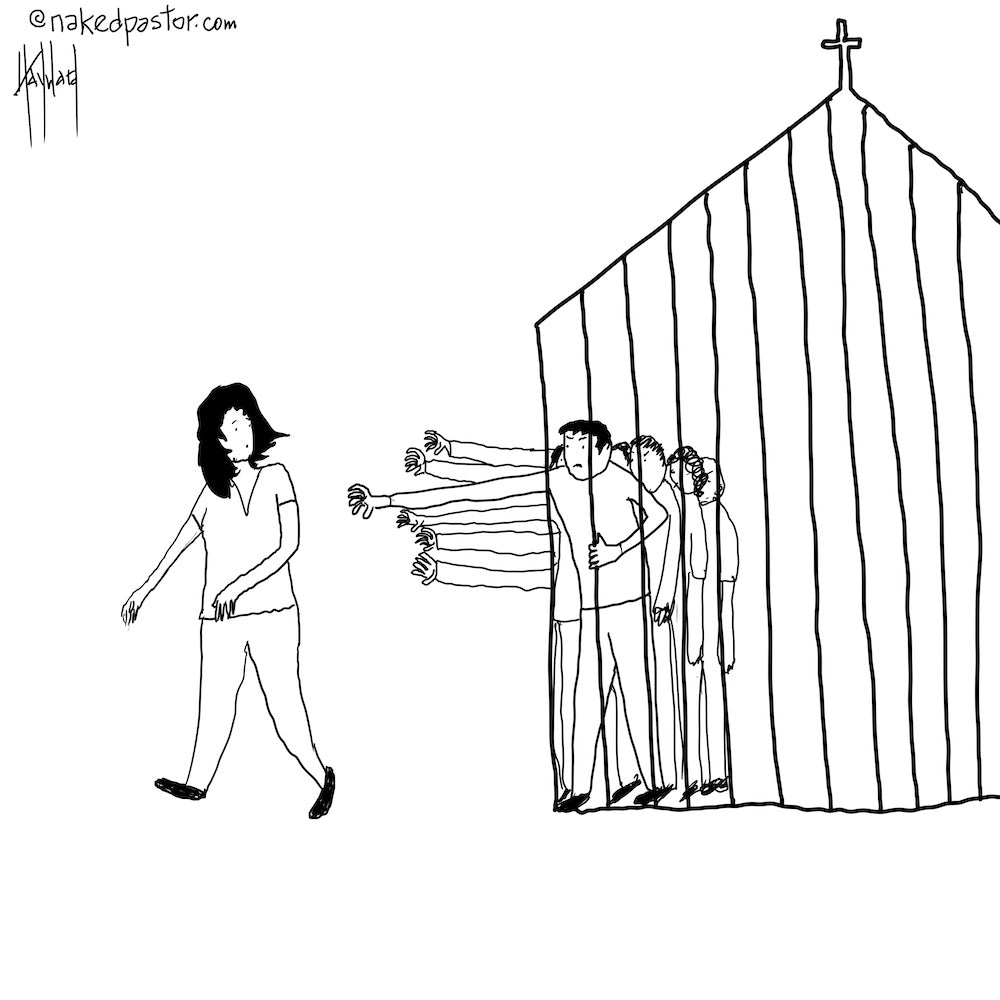The first time I mentioned the idea of spiritual independence, I received quite a backlash from some of my readers. People preferred that I had said "interdependence" because we shouldn’t be alone. But independence doesn’t mean being alone. I can be independent while interdependent with another. In fact, healthy interdependence depends on healthy independence.
The Different Reactions to My Call for Spiritual Independence
- One was that Christians are supposed to be in fellowship and not alone.
- Another reaction was that it is spiritually healthy and necessary to be in submission to someone in authority for guidance.
- Yet another one was that we all need to be accountable to someone.
I believe these are all misunderstandings of spiritual independence.
So I will address each one.
Does Spiritual Independence Mean Being Alone?
“Christians are supposed to be in fellowship and not alone.” We should not confuse independence with loneliness. They are two different things. Yes, it’s possible to be independent and alone. But it’s not necessary. For example, every country wants to be independent. But this does not mean it wants to be isolated. It wants to be autonomous, self-directing, and free, but it also wants to decide which countries to enter into a relationship with. It’s the same for you and for me. I want to be independent, autonomous, self-directing and free. However, I also want to decide who to be in a relationship with. No, I don’t want to be alone. But I’m willing to be if that’s the only way I can be independent.
Do We Really Need to be in Submission to a Spiritual Authority?
It is spiritually healthy and necessary to be in submission to someone in authority for guidance.” I do not disagree with this. But, we have to be very careful with what we mean by this. I’ve believed in spiritual independence for a long time. I’ve also put myself in submission to spiritual directors, guides, and coaches. But that’s the key: I put myself there. I chose them, and they decided to agree to help me. I insist that we should be able to choose who to receive our guidance from. Of course, when we are young in life and in our spirituality, it’s wise to listen to those who are in authority over us and to take good advice from trusted people. But they should be training us to learn how to choose for ourselves. Parents should teach children to be able to live without them. The best teachers are those who don’t teach their students a bunch of facts, but teach them how to study for themselves. Similarly, spiritual leaders should teach their people to be able to be spiritually healthy without them as well.
Does Being Spiritually Independent Mean Not Being Responsible?
“We all need to be accountable to someone.” When I first left the ministry and the church as a faithfully attending member, many people expressed their concern that I was no longer under an umbrella of protection or under the shepherding of a pastor or under a spiritual covering. They feared I was now vulnerable to demonic attack, error, and apostasy. Having been a pastor who hung out with other pastors for decades, I knew these ideas are carefully manicured and published by those in authority to fence the flock into the fold with fear. I agree that it’s true that when we are young in life or immature in our spirituality, we should willingly learn from those more mature. But you have the right to make yourself accountable to someone if you want to, and it’s your choice who that can be. To go out on your own is only dangerous if you’re not prepared for it. Preparing for independence is normal and healthy.When we talk about independence, we usually mean these things
When we talk about independence, this is what we mean:
- free from outside control
- not dependent on another’s authority
- self-governing
- not dependent on another for subsistence
- free-standing
We should agree that every person should aspire to this independence. We should also agree that every parent, teacher, and spiritual leader should aspire to guide their children, their students, and their people to this same independence.
We can be the captains of our own ships, the masters of our own destiny, and the authorities over our own lives.
This leads us to another reaction I often receive when I talk about spiritual independence. This one is important.
Some people say that they prefer to be interdependent rather than independent.
We Shouldn't Confuse Independence with Interdependence
Independence and interdependence are two different things.
They are related but mutually exclusive. You can’t be healthily interdependent unless you are first healthily independent. Yes, you can be independent while interdependent with others. A healthy person is able to move into an interdependent relationship without losing their independence.
I use the relationship Lisa and I have as an example. We’ve been married for years. We have a healthy relationship. We’ve worked hard for it. It’s not easy, but the rewards make it worth it. It has required a ton of personal growth for each of us, as well as a ton of growth in how to form healthy relationships.
We had to learn how to be independent adults who choose to love each other. I have to be healthy as an individual. Lisa has to be healthy as an individual. When these two healthy individuals choose to interrelate, then, it is functional and healthy, rather than toxic, codependent, and dysfunctional.
We choose to be interdependent.
There are different kinds of dependencies:
- There’s dependence.
- There’s codependence.
- There’s independence.
- There’s interdependence.
I think it is healthy to move through these different kinds of dependencies.
What is Dependence?
We all start as children dependent upon our caregivers. This is not only natural, but necessary. But we gradually learn how to fend for ourselves as we are cared for. We grow up, hopefully under the wise and gentle oversight of those who care for us. But we shouldn’t stay there. (Unless we aren’t able.)
What is Codependence?
“Codependency is a relationship imbalance where one person enables another person’s addiction, poor mental health, immaturity, irresponsibility, or under-achievement. Among the core characteristics of codependency is an excessive reliance on other people for approval and a sense of identity.” (Wikipedia)
This can start at a very early age. But unfortunately it can continue on into adulthood. Many parents have a codependent relationship with each other as well as with their children, and vice versa. If the children are raised well though, they learn self-confidence, autonomy, and their own healthy sense of identity. They can pass through or even avoid codependence and move on to the next stage.
What is Independence?
Independence is as mentioned previously. It means that you are free from outside control, that you are self-governing, that you are not dependent on another’s authority, and that you are not dependent on another for subsistence. Of course, we all should aspire to this.
As codependence is closely related to dependence, so is independence closely related to interdependence.
What is Interdependence?
Healthy interdependent relationships depend on healthy independent individuals. This is as true in a church as it is true in a marriage.
The first spiritual director I ever had was the best I ever had. I sought one out and found Sister Marie, an Abbess of a monastery who was willing to meet with me once a week. We met for two years.
The reason why she was the best was because even though I willingly submitted myself to her spiritual direction, she taught me how to become spiritually independent. She taught me how to think for myself, make decisions for myself, and decide for myself how I wanted to be spiritual. Even though she suggested what I should read, how I could meditate, who to study and contemplate, and how to be spiritual, at every moment I was free to walk away or free to accept her guidance and obey it or free to say that particular suggestion wasn’t for me.
I remember one day, with deep exasperation, I said to her, “I feel like such a stick in the mud!”
She gently responded, “What does it feel like to be a stick in the mud?”
No judgment.
No need to harness me into her spiritual style.
No obsession with aligning me with her idea of perfection or progress.
For her, what was most important and what she respected most was my autonomy and my ability to explore and find my own way to be spiritual.
Actually, what I mean is she encouraged me to find my own way to be me! I did find it. I’m still finding it. And I’m living my own life now.
I’m also free to choose who I am in a relationship with, how to recognize unhealthy relationships and how to form and nurture healthy ones. I’m able to decide how to be spiritual not only for myself, but for those I choose to be interdependent with.
This is healthy.
This is what I mean by spiritual independence.


